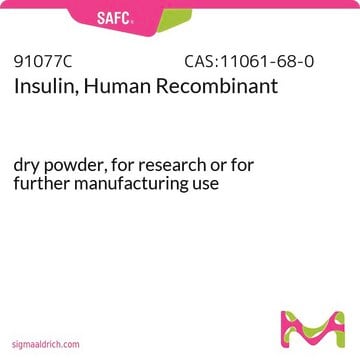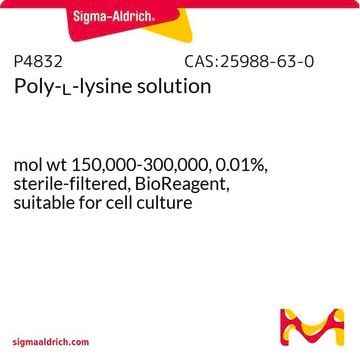SRP0221
PTPIA2 Active human
recombinant, expressed in E. coli, ≥90% (SDS-PAGE)
Synonym(s):
ICA512, Islet cell antigen 2, PTPRN, Protein tyrosine phosphatase-like N, R-PTP-N
Sign Into View Organizational & Contract Pricing
All Photos(1)
About This Item
UNSPSC Code:
12352200
NACRES:
NA.32
Recommended Products
biological source
human
recombinant
expressed in E. coli
Assay
≥90% (SDS-PAGE)
form
aqueous solution
mol wt
58.8 kDa
packaging
pkg of 20 μg
storage condition
avoid repeated freeze/thaw cycles
concentration
>0.02 mg/mL
NCBI accession no.
UniProt accession no.
shipped in
dry ice
storage temp.
−70°C
Gene Information
human ... PTPRN(5798)
General description
PTPRN (protein tyrosine phosphatase, receptor type N), more commonly known as IA-2 (insulinoma-associated protein 2), is a transmembrane protein of the PTP family. It was initially identified as a major autoantigen in type-1 diabetes mellitus. In neuroendocrine cells, it resides in the secretory granules. It is a multi-domain protein with intracellular, transmembrane and extracellular domains, and its intracellular region contains a pseudocatalytic domain. It gets processed multiple times during its life cycle, and its different parts are exposed to different cellular and tissue regions such as nucleus, cytosol, organellar lumen in the secretory pathway, extracellular pancreatic islet space, and membrane compartments. This gene is localized to human chromosome 2q35, and codes for a protein of 979 residues.
Protein tyrosine phosphatase. (PTP-IA2, ICA-512), Catalytic domain, (amino acids 693- 979), (Gene bank accession no. NM_002846), with N-terminal GST tag, MW = 58.8 kDa, expressed in an E. coli expression system.
Application
Useful for the study of enzyme kinetics, regulation, and to dephosphorylate target substrates.
Biochem/physiol Actions
PTPRN (protein tyrosine phosphatase, receptor type N) is cleaved at the cytosolic domain during insulin secretion. The cytosolic domain is relocated to nucleus where it promotes insulin gene transcription. This protein plays important role in hormone and neuropeptide secretion. This protein is crucial in controlling the dense core vesicle number in β cells and glucose-induced and basal insulin release. PTPRN null mice show reduced dense core vesicle (DCV) number, abnormal insulin secretion, female infertility, behavioral alteration, and circadian dysregulation.
Unit Definition
One unit will hydrolyze 1 pmol 6, 8-difluoro-4-methyl umbelliferyl phosphate (DiFMUP) per minute at pH 6.3 and 30°C.
Physical form
Formulated in 25 mM Tris-HCl, pH 8.0, 75 mM NaCl, 0.05% Tween-20, 50% glycerol, 2 mM EDTA, 1 mM DTT, and 10 mM glutathione.
Preparation Note
Thaw on ice. Upon first thaw, briefly spin tube containing enzyme to recover full content of the tube. Aliquot enzyme into single use aliquots. Store remaining undiluted enzyme in aliquots at -70°C. Note: Enzyme is very sensitive to freeze/thaw cycles.
Certificates of Analysis (COA)
Search for Certificates of Analysis (COA) by entering the products Lot/Batch Number. Lot and Batch Numbers can be found on a product’s label following the words ‘Lot’ or ‘Batch’.
Already Own This Product?
Find documentation for the products that you have recently purchased in the Document Library.
The dense core transmembrane vesicle protein IA-2 is a regulator of vesicle number and insulin secretion.
Harashima S
Proceedings of the National Academy of Sciences of the USA, 102, 8704-8709 (2005)
Structure of the mature ectodomain of the human receptor-type protein-tyrosine phosphatase IA-2.
Primo ME
The Journal of Biological Chemistry, 283, 4674-4681 (2008)
Tao Cai et al.
Acta diabetologica, 52(3), 573-580 (2014-12-22)
IA-2 is a transmembrane protein found in the dense-core vesicles (DCV) of neuroendocrine cells and one of the major autoantigens in type 1 diabetes. DCV are involved in the secretion of hormones (e.g., insulin) and neurotransmitters. Stimulation of pancreatic β
María E Primo et al.
PloS one, 6(9), e24191-e24191 (2011-09-22)
ICA512 (or IA-2) is a transmembrane protein-tyrosine phosphatase located in secretory granules of neuroendocrine cells. Initially, it was identified as one of the main antigens of autoimmune diabetes. Later, it was found that during insulin secretion, the cytoplasmic domain of
Our team of scientists has experience in all areas of research including Life Science, Material Science, Chemical Synthesis, Chromatography, Analytical and many others.
Contact Technical Service








